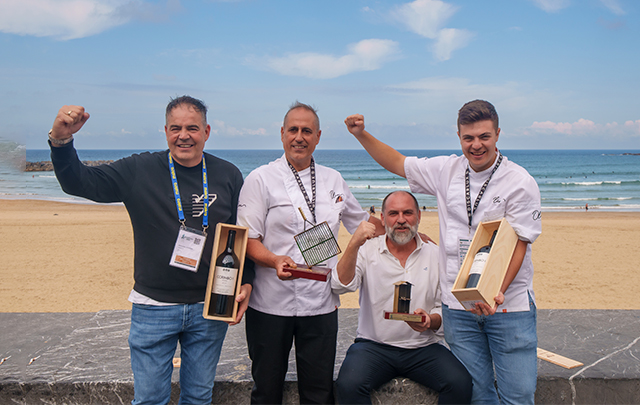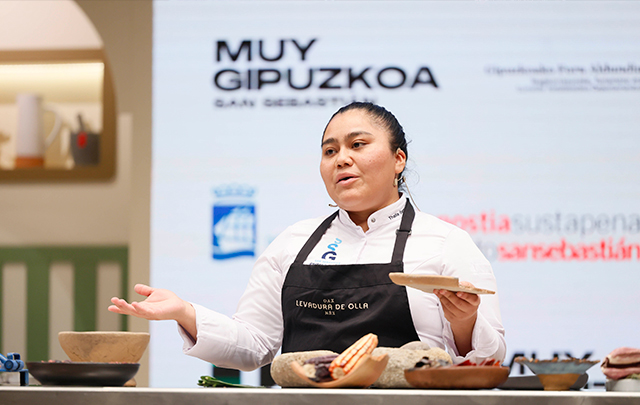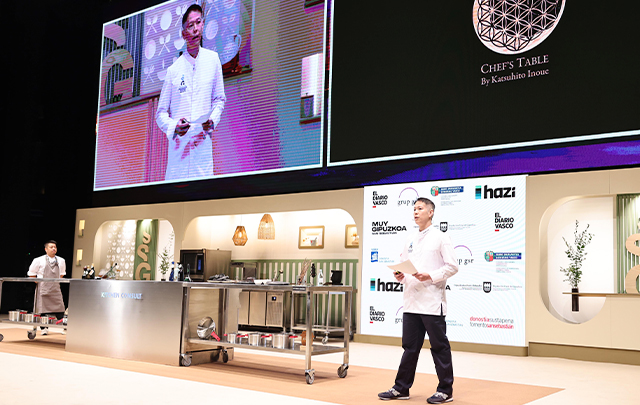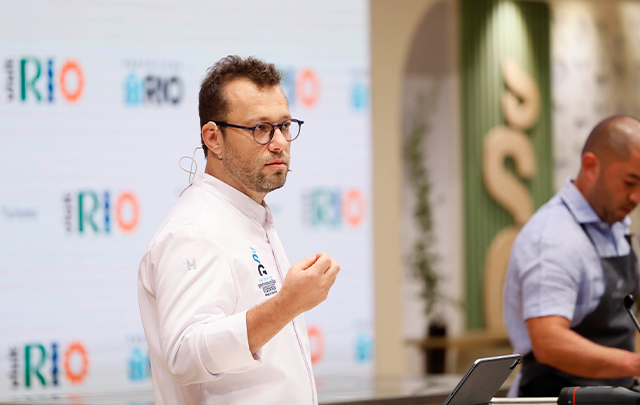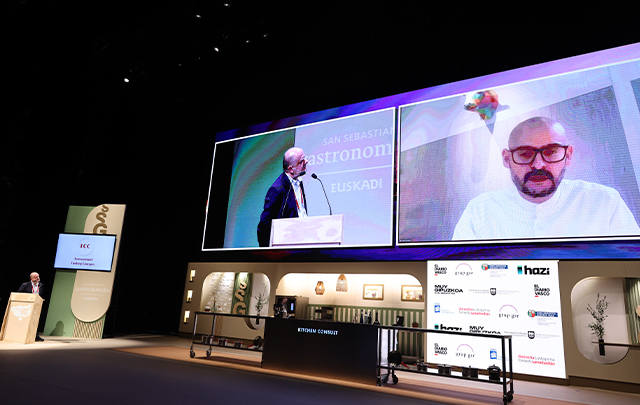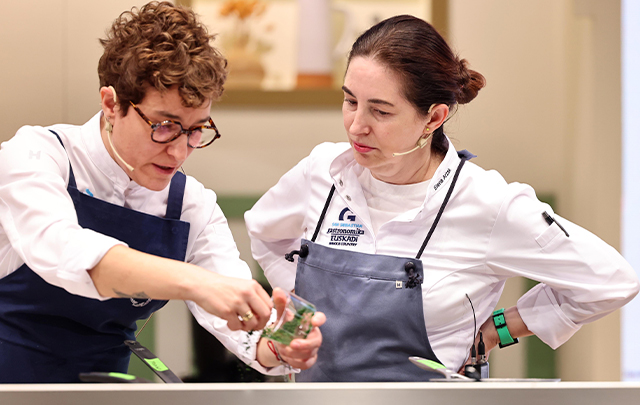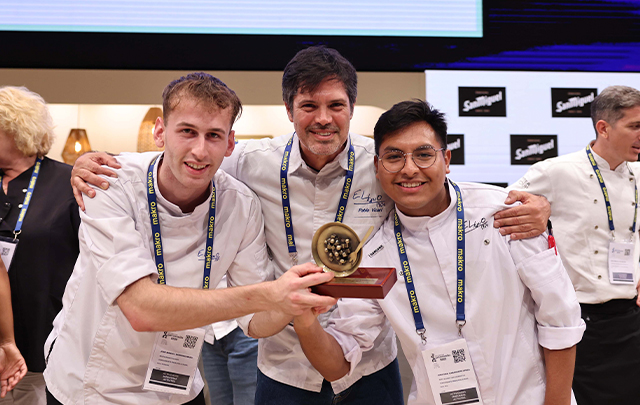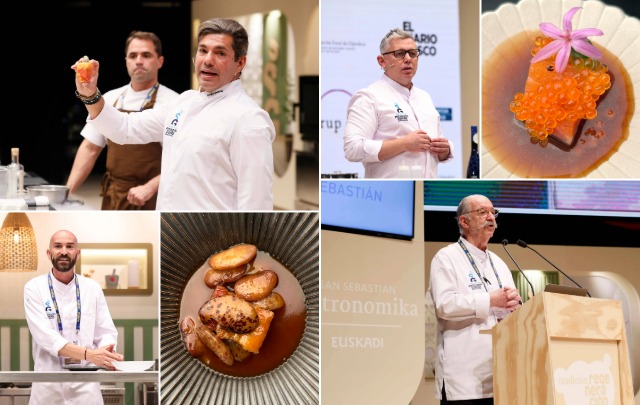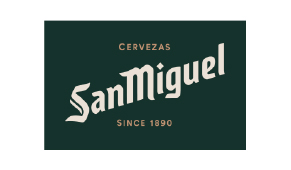News
Gastronomika proposes a unique adventure: cooking on a 16(th)-century whaling ship crossing the Atlantic
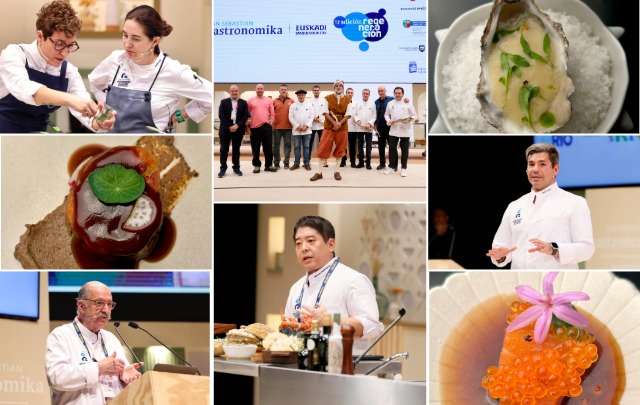
On the second day of Gastronomika, the theme of the sea as a connector of humanity played an important role, with a presentation on the new San Juan's adventure. This 16th-century whaling ship, which sank in Newfoundland, represents the key concepts of this 27th edition: Tradition and regeneration. Attendees experienced a unique historical reconstruction: the building of the Basque whaling ship San Juan (1565–2025), a project by Albaola (Pasaia) that will set sail for Canada in 2027. Historian Xabier Alberdi explained: 'According to Elcano's will, household items included grills, skewers, and copper pots, and the diet depended on non-perishable foods such as dry bread, legumes, and cod. The effectiveness of the sailors depended on it.' Benjamin Lana, the conference director, invited the attending chefs to participate in the project and apply to be the chef who will embark on this adventure. The successful candidate, selected through an exhaustive process by Albaola Itsas Kultur Faktoria, will experience cooking on board a 16th-century ship just as it was done five centuries ago to feed the crew who will recreate one of the greatest maritime feats of Basque fishermen. In the meantime, chefs Josean Alija, Pablo Loureiro, Roberto Ruiz, Javier Rivero and Gorka Rivero gave live demonstrations of possible dishes for the future menu of the San Juan's voyage.
Respect for the product, time, and tradition as the essence of cuisine also played a significant role at Gastronomika this Tuesday. From Álvaro Garrido's marine purity to Pedro Subijana's memory and career, and the emotion of Braulio and Pepe Simancas or Felipe Bronze's sensitive fire, the chefs argued that "true luxury is still flavour".
Álvaro Garrido of Mina* in Bilbao championed a cuisine based on the honesty of the product. "Mina's cuisine is based on fish. We go to the market every day, and our philosophy is simply to embrace change. People come to a restaurant to eat, not to be told a story.” His 17-item menu featured smoked trout with rosemary and skin, aubergine broth, mojarra, Cantabrian bonito, fish pastrami and tripe in a smoked sauce. He also announced the upcoming expansion of his restaurant: “We will continue to respect time, seasonality, and flavour.” Braulio Simancas, from El Silbo Gomero in San Cristóbal de La Laguna, Tenerife, also drew on tradition. Together with his father, Pepe Simancas, he gave an emotional presentation on seafood cuisine. “My father is a great role model,” Braulio acknowledged, as they reinterpreted classic recipes with respect and curiosity. Their menu included seasonal fish stew, boiled mojo sauce, Canarian ranch and stewed octopus, blending memory and technique.
50 years of history
For his part, Pedro Subijana (Akelarre***, Donostia) celebrated 50 years in the kitchen by reaffirming his loyalty to his own style. 'I don't consider myself an artist or an innovator, but I have always experimented and remained faithful to my style. I don't think I've ever lost it, and that's the hardest thing.” He presented four signature dishes, including smoked Idiazabal anchovy cheese and txangurro with instant curd, and emphasised the importance of culinary education. 'As long as you have the desire and enthusiasm, you have to keep living and doing what you love. That's how I plan to continue.'
Felipe Bronze (Oro**, Rio de Janeiro) made an international contribution, emphasising his connection to the host city: “San Sebastián taught me to understand cuisine, creativity and community. It is the most inspiring city in the world of gastronomy”. He presented his avant-garde grilled cuisine, which focuses on produce and emotion. This included an oyster cooked using different techniques and cashews. He explained, “Oro is basically Rio de Janeiro. Everything I do in the kitchen is about people.”
Chef Mitsuharu 'Micha' Tsumura (Maido, Lima), who was recently recognised as the World's Best Restaurant 2025 by The World's 50 Best Restaurants, gave an inspiring talk on Nikkei cuisine and regeneration based on respect for the environment. “I return with great excitement to this event, considered the temple of world cuisine,” he said. Of Japanese descent, Tsumura emphasised the importance of tradition and the Amazon in his cuisine: “The best way to regenerate is often not to destroy. It's about harvesting at the right time and being respectful of the environment.” During his speech, he paid tribute to the traditional cooks of Arequipa and Ayacucho, emphasising that "innovation only makes sense when it is nourished by memory".
Female perspectives and new realities
The final part of the day brought together leading figures from the national and international gastronomy scene. They discussed the importance of memory, sustainability and passing on knowledge. Sergio Ortiz de Zárate, the chef at Zárate* in Bilbao, championed local produce and products, with fish and seafood forming the backbone of his cuisine. "My cuisine is born out of respect for the Cantabrian Sea, dialogue with fishermen, and the search for purity in every dish."
In one of the day's most emotional sessions, Elena Arzak of Arzak*** (Donostia, San Sebastián) and Nieves Barragán, chef at Sabor* (London), took to the stage together for a conversation led by journalist Lisa Abend on 'the joys and sacrifices of being a great chef'. Born in Santurce, Barragán prepared baby squid stuffed with chanterelles and prawns with ink sauce, reflecting on her career in the United Kingdom: “Travelling is what inspires me the most. It keeps me learning and innovating. Cooking is now more relaxed and fun; you enjoy it more.” Arzak, for her part, surprised her colleague with a beautiful marinade of ham, salt and porrusalda purée, emphasising the importance of adapting to social changes. 'Today's kitchens are more relaxed. There's no shouting anymore. I've learned to work a little less and enjoy myself more.' Despite the personal sacrifices, both agreed that their love for the profession and the satisfaction of seeing their teams grow were their greatest rewards.
The conference also featured Roderick Sloan, a chef, fisherman and seafood gatherer from the Norwegian Arctic who supplies some of the world's best restaurants, including Noma. In his presentation, Sloan emphasised the direct connection between the sea and the kitchen, defending artisanal and sustainable fishing as the only way forward: “The sea is not a resource; it is a living being that we must respect. “The sea is not a resource; it is a living being that we must respect,” he said. Hailing from the remote Steigen peninsula, where he has worked for over three decades, Sloan shared his daily experiences in the cold northern waters, presenting cod and Arctic sea urchins as symbols of an extreme territory demanding patience, knowledge, and commitment. "Every piece I catch has a story behind it, a process and a temperature that determine its flavour," he explained, emphasising that true luxury lies in unspoilt nature.
Great recognition
In a conversation entitled ‘El Somni II: a dream come true’, Benjamin Lana, director of Gastronomika, interviewed Aitor Zabala, chef at Somni 2.0*** in Los Angeles, United States. They discussed the creation and evolution of his restaurant in Los Angeles. Zabala explained how ambition and sacrifice were fundamental to achieving three Michelin stars and becoming the only Spanish chef to do so outside Spain. “There have been times when I have wanted to give up, but we have learned to seize each day as an opportunity and not to become disheartened by long-term goals. The most beautiful things always happen at the table.” Regarding his cuisine, he added, 'I don't have a specific style. I want my cuisine to excite and surprise, but I don't want to pigeonhole myself because I like creativity. I try not to pigeonhole myself because, ultimately, that gives me freedom.” Zabala is clear that “sooner or later, he will return to Spain. It depends on how things go, of course, but I will probably retire in Spain.”
The programme concluded with Thomas Troisgros from Oseille* in Rio de Janeiro, Brazil, who showcased the new generation of the Troisgros dynasty with a proposal focused on the balance between technique and naturalness. There was also Niklas Ekstedt from Ekstedt* in Stockholm, Sweden, who gave a brilliant demonstration of cooking over a fire without electricity because, as he explained, “fire is not just a technique; it is a way of thinking about cooking and reconnecting with the essentials”. Finally, there was Ramón Freixa from Tradición in Madrid, who presented his new project with a more intimate approach: 'Tradición is my way of returning to the cuisine that I fell in love with: simple and direct, where emotion matters more than aesthetics.'



